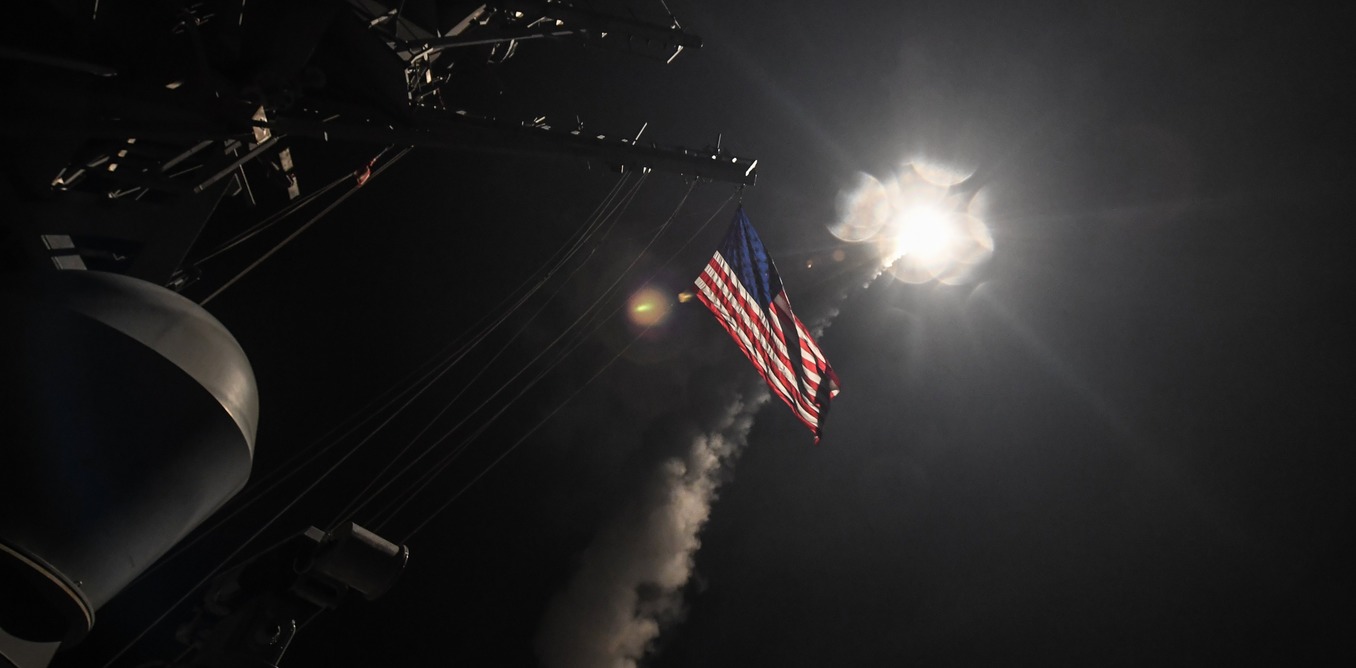Make no mistake. The April 6 U.S. airstrike on Syria following Bashar al-Assad’s chemical weapon attack is a remarkable shift in President Donald Trump’s – and Washington’s – past policy.
As president-elect, Trump’s Middle Eastern concerns centered on defeating the Islamic State and depicted Syria’s millions of refugees as potential extremists and a threat to U.S. borders. The president now justifies American attacks on Syrian airfields as a “vital national security interest of the U.S.”
Trump himself said that Tuesday’s ghastly chemical attacks changed his mind on the Assad regime. Just as suddenly, U.S.-based Middle Eastern experts and key foreign leaders have approved this U.S. policy move. Some Syrians, too, are showing appreciation for “Abu Ivanka,” or the “Father of Ivanka.”
Moreover, the U.S. airstrikes may have involved some strategic thought and multilateral diplomacy, two central aspects of foreign policymaking not previously associated with the Trump administration. The choice of the airfield for attack was a limited, comparatively low-stakes target. Both Russia and Syria had advance knowledge from the U.S. of the attack.
Syrian and Russian outrage at the U.S. involvement is an expected response to this first open major American military action against Assad since the 2011 civil war began. But that doesn’t mean the conflict will necessarily entangle the U.S. more deeply. Indeed, Russian frustration with the particular nastiness of its ally’s chemical attack may be a relief to President Vladimir Putin because it signals to Assad that he had better be careful about how he tries to reassert control over Syria. That signal, however, need not undermine Assad himself.
A one-time thing?
So what comes next for U.S. policy?
Was this a one-off U.S. intervention reflective of Trump’s interest in doing “something” in response to a particularly shocking event?
Or did Trump wish to look strong after critiques of his foreign policy during a visit by China’s President Xi Jinping or distract attention from his overall low approval ratings?
We don’t know, because the U.S. leader has shown limited consistent attention to foreign policy.
The easiest guess? Trump’s lack of prior expertise in the Syrian crisis, his moves back toward the U.S.‘ more typical globalized outlook and apparent genuine shock at Assad’s brutality may signal a real shift. Yet, even if so, it is unlikely founded on a broader policy vision. The problem of what Trump does when faced with a complex global challenge, without the background and fully staffed bureaucracy to respond rapidly, has been raised appropriately by journalists and pundits. We have seen no sign so far that the White House has a strategy on Assad larger than the air strike.
Of course, Assad, Putin and Iran’s leadership do have such strategies. They involve continued strengthening of the Syrian strongman’s power.
The long-term, entrenched nature of these countries’ commitments cast doubt that the U.S. for now will take bigger steps to undermine Assad’s recently improved position in Syria. The Trump administration has expressed indifference toward complex diplomacy. Indeed, greater U.S. determination to adopt a multipronged, multilateral effort to weaken Assad or crush Syrian opposition might make defeating the Islamic State harder. It would embroil Trump in a problem that proved too vexing for the extensive brainpower and experience of the Obama administration. And it might risk long-term, unpopular military engagement, with greater responsibility for state-building, like what bedeviled Washington a decade ago in Iraq.
Moreover, in terms of broader U.S. military involvement, Syria today is not a clear analogy with Iraq in 2003. The absence of a prior attack on U.S. soil, the longer-term plan of U.S. policy advisers to topple Saddam Hussein’s Iraqi government and that government’s lack of powerful international allies are all key factors that facilitated American military escalation in Iraq that are not present in Syria.
Syrians, and people who care about Syria, might hope that a U.S. airstrike leads to new, international, creative efforts to try to alleviate Syrians’ suffering. We all know that President Trump is quite capable of actions that surprise. Could a sustained American commitment to stop Assad’s killing be such a surprise? Such a commitment would require not quick attacks but subtle diplomacy, with the credible threat of force as one policy lever among many. It’s unlikely, but with Donald Trump, it is hard to know for sure.
 David Mednicoff does not work for, consult, own shares in or receive funding from any company or organisation that would benefit from this article, and has disclosed no relevant affiliations beyond the academic appointment above.
David Mednicoff does not work for, consult, own shares in or receive funding from any company or organisation that would benefit from this article, and has disclosed no relevant affiliations beyond the academic appointment above.



 Nasdaq Proposes Fast-Track Rule to Accelerate Index Inclusion for Major New Listings
Nasdaq Proposes Fast-Track Rule to Accelerate Index Inclusion for Major New Listings  FxWirePro- Major Crypto levels and bias summary
FxWirePro- Major Crypto levels and bias summary 

































